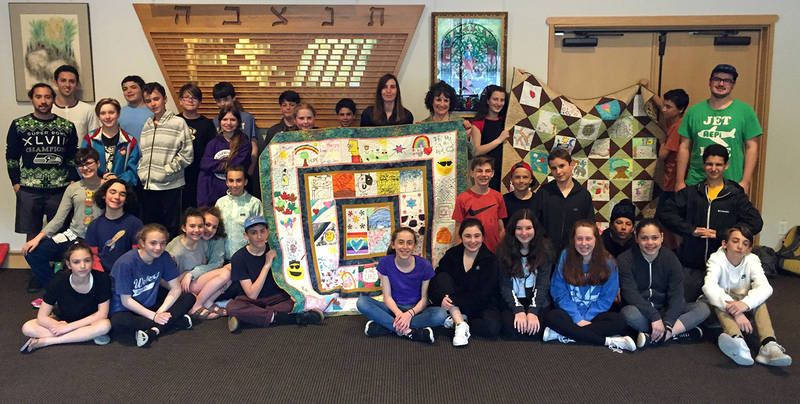7th - 9th
Curriculum: 7th - 9th Grades
7th Grade
Response to Modernity
The 7th graders have a schedule that allows them time to meet more students, choose classes of interest to them, and learn from many different teachers. This enhances their peer-to-peer socialization, gives them opportunities to be inspired in different ways by their various teachers, and also allows them to move from class to class as they are accustomed to doing in Middle School.

The Core Judaics / Homeroom class is comprised of students who represent the diversity of the class as a whole (rather than being based on anyone’s Hebrew learning level). In fact, we encourage parents to use the registration forms to request, if they wish, a student with whom they would like their child to be placed.
The curriculum for this Core Judaics / Homeroom class, “Response to Modernity,” includes units on Comparative Judaism (comparing the different movements within Judaism), the Holocaust (including an introduction to the history of anti-Semitism and the way that the Holocaust pushes us to fight against genocide or racism wherever it appears in our world today), and the history of the modern State of Israel.
For the Sunday morning elective period, students have three elective units throughout the year. For each approximately seven-week unit, they choose from among four elective topics. On Tuesday evenings, the 7th and 8th graders together have two or three elective units and choose from among as many as seven elective topics for each unit. (Students who are still preparing for their Bar and Bat Mitzvah ceremony brush up on their Hebrew in a B’nai Mitzvah Preparation class.) Students choose among topics as varied as Modern Jewish Music, Israeli Film, Jewish Humor, Jewish Values Through Improv, Ancient Jewish Poetry, and more.
Seventh graders are also encouraged to become involved with jBATY (junior Beth Am Temple Youth).
8th Grade
Tough Decisions for New Jewish Adults
 The 8th graders have a schedule that allows them time to meet more students, choose classes of interest to them, and learn from many different teachers.
The 8th graders have a schedule that allows them time to meet more students, choose classes of interest to them, and learn from many different teachers.
This enhances their peer-to-peer socialization, gives them opportunities to be inspired in different ways by their various teachers, and also allows them to move from class to class as they are accustomed to doing so in Middle School.
The Core Judaics / Homeroom class is comprised of students who represent the diversity of the class as a whole. In fact, we encourage parents to use the registration forms to request, if they wish, a student with whom they would like their child to be placed.
The Core Judaics / Homeroom curriculum’s primary purpose is to explore the major world religions through a Jewish lens. Students also explore the state of Jews in America and around the world. Additionally, throughout the year we explore “Hot Topics” that the 8th graders themselves identify as being of interest. These topics could include topics such as a Jewish understanding of what comprises a healthy friendship or romantic relationship and the Jewish understanding of caring for our bodies (piercing, tattoos, etc.).
For the Tuesday evening elective period (which is combined with the 7th graders), the students choose from as many as seven electives for each elective unit. There are two to three elective units during the course of the year, so the students have a chance to explore a number of different topics. Students choose among topics as varied as Modern Hebrew, Modern Jewish Music, Israeli Film, Kabbalah and Jewish Mysticism, Jewish Humor, and more.
Our 8th graders are also encouraged to become Madrichim (teaching assistants), and become involved with jBATY (junior Beth Am Temple Youth).
9th Grade
Activist Judaism
 In the 9th grade curriculum, “Activist Judaism,” the students address questions such as: “How can we apply our values and ethics to real life modern situations?” and “What are the mitzvot that should guide our lives?”
In the 9th grade curriculum, “Activist Judaism,” the students address questions such as: “How can we apply our values and ethics to real life modern situations?” and “What are the mitzvot that should guide our lives?”
During a majority of the sessions, the students participate in interactive lessons about social justice and mitzvot. Then, on the rest of the Tuesday evenings, the students go out and work in small groups at local social service agencies. By volunteering in such intensive community service projects, all framed within a Jewish context, students learn about the power of the individual to make a difference in the lives of others and about our responsibilities as Jews to help fix the problems of our world.
All ninth through twelfth graders are also encouraged to become Madrichim (teaching assistants), and become involved with our outstanding Beth Am Temple Youth group, BATY.
Thu, May 2 2024
24 Nisan 5784
Upcoming Programs & Events
May 4 |
May 10 Congregational Shabbat Dinner Friday, May 10 7:30pm |
May 11 B_Mitzvah of Ellen Belknap & Abner Ackley Shabbat, May 11 10:30am |
May 18 |
May 22 Annual Meeting Wednesday, May 22 7:00pm |
This week's Torah portion is Parashat Acharei Mot
| Shabbat, May 4 |
Yom HaShoah
| Monday, May 6 |
Z'manim
| Alot Hashachar | 3:56am |
| Earliest Tallit | 4:44am |
| Netz (Sunrise) | 5:49am |
| Latest Shema | 9:27am |
| Zman Tefillah | 10:41am |
| Chatzot (Midday) | 1:06pm |
| Mincha Gedola | 1:43pm |
| Mincha Ketana | 5:22pm |
| Plag HaMincha | 6:53pm |
| Shkiah (Sunset) | 8:24pm |
| Tzeit Hakochavim | 9:17pm |
| More >> | |




